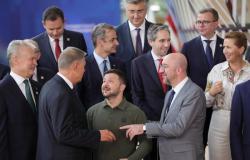The European center of gravity inevitably shifts southwards, from the Baltic to the Mediterranean. In the very construction of political alliances, made difficult by the institutional structure of the Union, our country could have a role of patient weaving between countries and between political areas. Sacconi’s Canto libero
Share on TwitterShare on FacebookShare on LinkedInShare via WhatsappShare via Email
Despite the criticism directed by many observers at the electoral campaign which ended yesterday, today’s and tomorrow’s vote has an objective historical value for Europe and for Italy. Beyond the outcomes, of which some tendencies are already known, it nevertheless marks the conclusion of the long phase which was characterized by a stable compromise between the People’s Party and the Socialists.
In particular, the past legislature made it possible to verify the exhaustion of policies strongly marked by ecologism as an independent variable and of the illusion of the “end of history” with the consequent indifference towards the dislocation of production chains. The task entrusted by the Commission at the end of their mandate to Enrico Letta and Mario Draghi reiterated the priority objective of productivity and the need for greater independence from raw materials and many semi-finished products coming from geopolitical areas at risk of trade restrictions.
The Union will naturally find the two fundamental directions for its security and growth, on the one hand the transatlantic one and on the other the one with the Middle Eastern and African countries free from Chinese and Russian influences. In this context, Italy objectively finds a new centrality because it is firm in its Western alliance and open, through the Mattei Plan, to the awakening of the continent with which we border.
The European center of gravity inevitably shifts southwards, from the Baltic to the Mediterranean. In the very construction of political alliances, made difficult by the institutional structure of the Union, our country could have a role of patient weaving between countries and between political areas. The upward evolution of the great functions of the “sword” and the “felucca”, in addition to that already achieved of the currency, could be accompanied by the devolution to the Member States of most of the “minor” matters on which the Commissions of the past they are very practiced. In short, a new phase opens in which we could also export that “Italian exception” of which John Paul II spoke and consisting in an idea of modernity that cannot ignore the awareness of the common Greek-Judaeo-Christian roots.
Maurizio Sacconi






